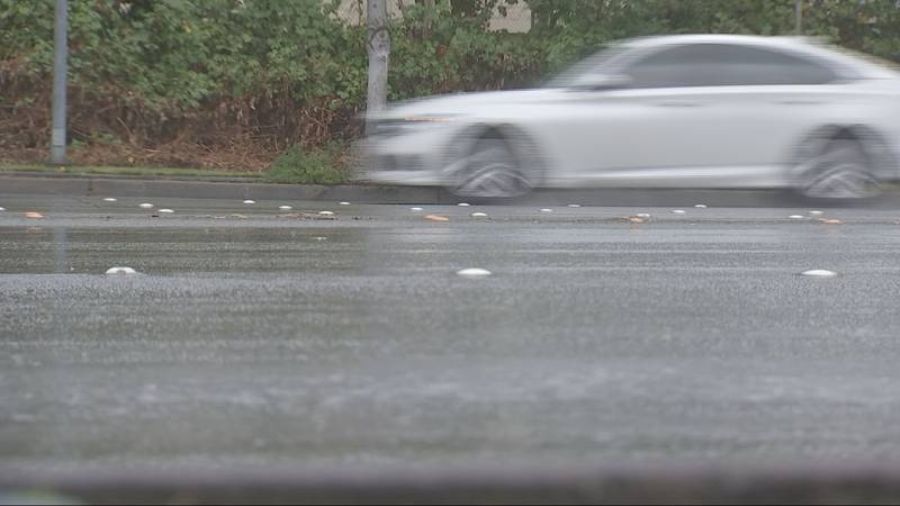Driving skills may be rusty post-pandemic, but shouldn’t be lost forever
May 31, 2021, 8:21 AM | Updated: 8:21 am

(Photo by Karen Ducey/Getty Images)
(Photo by Karen Ducey/Getty Images)
A lot of people, including KIRO Radio’s Dave Ross, are reporting that because they’ve been holed up for so long that once they get back into a car, it’s almost like a new experience for them.
Fortunately, there are people studying things like the neuroscience of driving, one of whom is Dr. Elizabeth Walshe with the Center for Injury Research and Prevention at the Children’s Hospital of Philadelphia.
Seattle Street View campaign gives ‘striking’ glimpse at how city has progressed during pandemic
Is this phenomenon normal if you haven’t driven for a while?
“Yeah, I think a lot of people can probably relate to your story,” Walshe said. “I know a lot of people who started working from home, didn’t drive to work, didn’t cycle to work, which is my case, something that they used to do two, or three, or four times a day, suddenly they’re not doing it at all for weeks or months. And so I’ve had a similar experience to you where there were a couple of weeks, I didn’t get out on my bicycle at all and then when I did I felt like the cars were really close to me, like closer than they used to ever be.”
“There’s this kind of like rustiness, I guess, that a lot of people are feeling, like are they forgetting how to do things that they thought they would never forget,” she added.
It’s unlikely, however, that we’re forgetting how to drive entirely, she said.
“The type of memory that’s important for remembering how to drive is called procedural memory. And it’s a really strong long-term type of memory and it’s very difficult to forget,” she said. “Our other types of memories, like memories for faces, or places, or things that happened in your past, your autobiographical memories, those we can forget all the time, and that’s kind of common for us to forget.”
“But things like riding your bike, you never forget how to ride a bike, driving your car, or if you learned how to play piano at a young age, you very rarely forget how to play piano. But you can feel rusty if you don’t do it for a while,” Walshe explained.
Part of the explanation for why we remember how to ride a bike or drive is certainly due to repetition.
“That helps with keeping, moving something from, say, short-term memory into long-term memory. But sometimes some memories are so intense that you don’t need to repeat them multiple times,” Walshe noted. “Sometimes you learn from a really, really bad experience not to do something ever again, like maybe you ate that dodgy street food and then you were sick for five days and you’re not going to go back to that.”
“So there is something about the intensity of the experience, but repetition — I think if we’re thinking about driving and things like that, it’s definitely repetition,” she continued. “And if you think about when you first started to learn how to drive, it’s really complicated. You’ve got a lot of things to remember, how to control the pedals, what to do with the wheel and the other controls in the car, like the indicator, but then also pay attention to everything that’s going on on the road around you, which you can’t control and which could change at any second.”
As a new driver, it’s stressful to have hazards coming your way at all times.
“But then, the more you do it, the more you practice, the more automated some of those vehicle control things become. So you don’t have to think about your hands anymore, and you don’t have to think about your feet so much, and that frees up some more mental space for paying more attention to what’s going on on the road around you and being ready to be able to react if there’s a hazard or potential crash situation,” she said.
UW study hopes to figure out if it’s possible to have a productive internet argument
This could also explain why some people have reported being more tired than we used to be because we’re having to relearn what was once routine.
“It takes more cognitive resources, right? More real estate. Some people describe it that way,” Walshe said. “Things that you didn’t have to think about, now you have to remember to think about because you’re a little rusty. And I think that goes for other things, too. I have friends who haven’t been out socializing and now they feel a little rusty with their social skills too, right, how to have those conversations.”
“It’s for anything you haven’t done for months, and sometimes we think we’ve done something so many times we’ll never forget it,” she added. “And even with driving, maybe you’ve driven the same route every day to your old job three or four years ago. But if you had to go back and do it now, you might remember it, or you might start questioning yourself, like was it the third turn on the right or the second turn on the right, you know? So you do lose a little bit if you don’t use it, but it’s unlikely that it would just disappear because it’s this type of long-term procedural memory.”
Listen to Seattle’s Morning News weekday mornings from 5 – 9 a.m. on KIRO Radio, 97.3 FM, and on your smart speaker as well. Subscribe to the podcast here.














